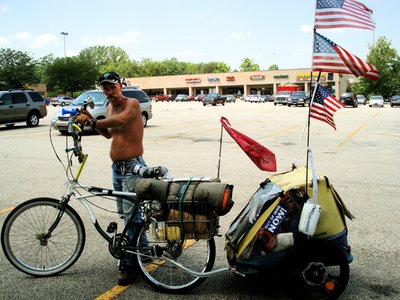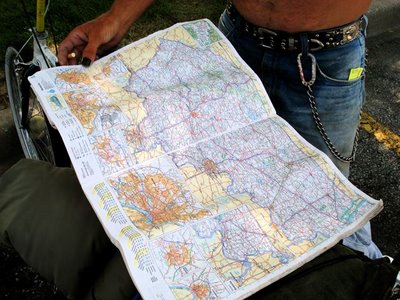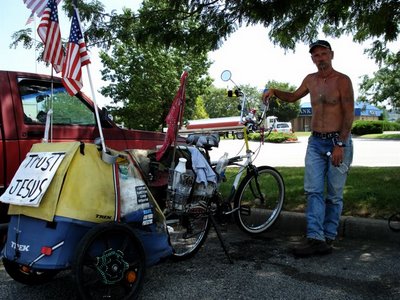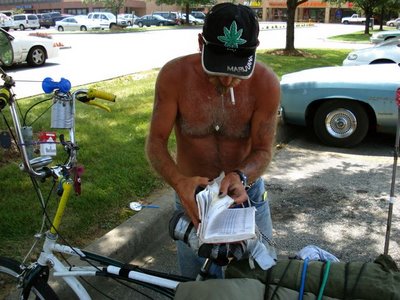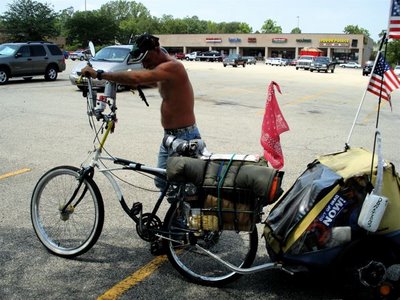
In 2003, Carl left South Dakota on a bicycle with all of his possessions packed in a small, attached wagon. Today he continues to travel on his bike throughout the United States, working mostly as a drywall finisher and painter, when he can find it. Carl has no telephone, mailing address, nor does he ever stay in one place for too long. The only way to find him is if you happen to run across him on the side of any given American road. Today, Carl is on his way to Bardstown, Kentucky to visit his only child, a 19-year-old son.
For years, Carl hitchhiked to get around, but as the late 1980's and 90's approached, hitchhiking became almost impossible to do. "I used to think people were scared, but now I think it's that they just don't care," says Carl. "They probably look at me on the side of the road, with my thumb sticking out, and think that I am a bum. They don't realize that I am just trying to get from one place to the next, just like everyone else." In 2001, Carl hitchhiked for the last time, as it took him over six months to get from Arizona to South Dakota. Given that the same trip in the late 1970's would have taken only three or four weeks, Carl decided that he needed an alternative means of transportation. With rising gas costs and global warming looming, he chose a bicycle. In a way, Carl says that riding a bike is his way of telling the government, "Hey, I don't need your oil".
Throughout his life, Carl has lived as a vagabond. He was born in Walla, Walla Washington and moved to Texas when he was fourteen with his mother, stepfather, two younger brothers and sister. Not long after the move, his mother abandoned the family, leaving the children behind with their stepfather. Carl can only speculate why she left, "Maybe it was because of the crap I was getting into, skipping school, not caring, and the way that my step dad was treating her". A year later his mother died and his stepfather, wanting nothing to do with the children, placed the entire family into foster care. Being that Carl was fifteen, he felt old enough to take control of his own destiny. So he did the proverbial, run away and joined the carnival. "I was the smart one and was like, 'I am not going to live somewhere where somebody cares nothing more for me than the food stamps and extra checks,'" he explains. At first, Carl was the gopher for carnival workers; running errands, grabbing tools, etc. Eventually as he got older, he began operating his own booth. The carnival lifestyle was conducive to Carl's disposition, and he enjoyed constantly traveling while meeting new and interesting people. It allowed him to finally start living life the way he thought it should be lived.
As Carl entered his twenties, he truly believed that he was taking a stand with his unique lifestyle. "I thought, hey, I am a free person, I can do what I want, when I want, as long as I am not hurting anyone else, as America was supposed to be," he exclaimed. But the day he turned thirty, Carl's attitude suddenly changed. He started believing that no matter what he did with his life, somebody else was always going to have a different opinion of him, and then someone else would have different opinion from that one as well. And because of this pattern, he started to feel that all people could only do what they wanted to do, within the boundaries of what society and the government wants us to do. He felt persecuted for his freedom.
Today, in general, most people look at Carl, who is now forty-four, as if he were a homeless bum. But to Carl, his bike is home. He decorates it the same way that a person would decorate their house. His most important possessions, which are his CD's, clothes, blankets, a sleeping bag, tent, radio, and fishing pole are carefully stowed away in the wagon. While his bicycle baskets act as a garage, - holding tools, ropes and various other hardware devices. On the back of his wagon hangs a large hand-painted sign that reads, "Trust Jesus", in addition to the three American flags he rescued from the ground that now fly from a tall pole. His elongated handlebars are covered with sentimental jewelry, key chains, and knickknacks that people have given him along the way. He even has a blue bicycle horn. The bike keeps Carl in good shape; his legs are strong, as well as his hands.
Carl says that he is like most people and is just looking for a way to get from one day to the next. "I'm not out to get rich because when you die, you can't take it with you. There is no sense in it." Carl thinks that some folks would consider him an extremely strong person for the way he lives, but others would call him lazy because he doesn't hold down a job very long, own a car, or live in a big house. The truth is that Carl is a 'live-for-the-moment' type person. When he sees something he wants to do, he simply does it. "I have been to the Grand Canyon, Niagara Falls, to the Smokey Mountains and all three oceans, and have seen a lot of things in this country that a lot of Americans have never seen. " With limited funds, Carl has come to realize that in order to get from one place to the next, nobody is going to help him, unless he does it himself.
Carl admits that he often gets sad. "I am a people person and sometimes when I get around people, they shun me, turn their nose up at me because of the way I look or live my life, and it hurts my feelings." He doesn't understand why people cannot just get along and accept the differences in each other. "Just because I have a funny beard, no hair, tattoos, and painted finger nails doesn't' mean that I am any different from you. We all come from the same place, Mother Earth," he adds. He knows people all over the United States too. And though he wouldn't exactly call them his best friends due to the infrequency of his seeing them, when he does come into town, most are more than willing to help him out, knowing he won't be staying long. Carl sees himself as a very kind and generous person who enjoys giving. "I have been without and therefore have a lot of compassion for people," he affirms. After Hurricane Katrina last year, he even traveled down to Louisiana on his bike to aid in the rebuilding.
Oftentimes, Carl encounters young people who are impressed and want to mimic his lifestyle. But he is quick to tell them, "No, you don't want to live like me. Stay in school. Get a strong education. That way when you want to say, 'the hell with society, I'm living my life the way I want too', you'll have something to fall on when you get into a situation where you just can't do no more." Carl, who has little formal education, says that education is an essential resource in today's society. He believes that kids need to get smart before they get adventurous. "Living out here, like I do, it's hard, people don't care about you." He often can't even afford to eat and has learned to eat like the Indians did, hunting and gathering his own food, amidst a modern day landscape.
Carl doesn't believe himself wise, because, as he would postulate, a man who calls himself wise is actually a fool. But like most people, he admits he has his own opinions about the way we should live life, and how our government has gone wrong. On the average though, he typically just keeps his thoughts to himself, as he feels that no one really cares to listen.
One of Carl's favorite key chains is engraved with his favorite acronym, WWJD, or "What Would Jesus Do." Carl often thinks about that; what would Jesus think or say if he saw him riding down the road on his bicycle next to all these Americans driving SUV's, starring at him like he is insane? He thinks that Jesus would polish his outlook and give him a different way of reacting to the situation, and turn the other cheek when those people scold or look down on him. After all, he realizes most people just don't know any better, and that people are conditioned based on the way they are raised.
After talking, Carl began to realize that just maybe he was still that free-spirited twenty-year-old, taking a stand, living freely and giving the average American something to think about. He'd like to think so, anyway.
WHAT DOES CARL THINK?
Riding his bike around the country has given Carl the opportunity to observe our land closely. He believes that as intelligent inhabitants of this earth, we should be able to do something more about protecting it. "We were created from Earth and when we die, we go back to it. And when I die I don't want to be buried in a big pile of garbage somewhere. I want to be made into dust, not cockroach food, mixed with the garbage of humanity." Carl sees more and more constructions of highways, clustered cookie-cutter homes, landfills and deforestation. "The way humanity is treating this world is like cancer. It chips away at the a spot, until there's nothing in it, and then spreads to another place." He's not amused by the idea that only a handful of people own the majority of the land in this country. When he finds a nice place to set up a tent, or a pear tree to pick from, the owner of that land usually comes out and yells at him, or calls the police. "God gave us this earth to live on, and to coexist with, not to own it," explains Carl.
Carl has looked deeply at the state of our country and sees that Americans desperately need help. He gets frustrated when he reads about people like Angelina Jolie helping children in other countries, because he sees the same atrocities happening here. Carl has met tons of people who are homeless, and who grew up that way, never really knowing what it was to have a home. "They go to school and when they come home they go to a shelter. And they live their life in that shelter, because the economy is so bad that each parent has to work two or three jobs just to make enough money for the gas and electricity." Plainly, Carl does not think that America is as great as it once was.
Carl believes that this country could use a new barter system. For example, if you cut my trees, then I will do your electrical work. Americans have become so reliant on the green dollar that money has almost replaced God. He would like to see people learn how to quit hating; for countries to demolish all guns and weapons of mass-destruction; and for people to start caring. When they see someone who is down on their luck, instead of yelling at them to get a job, help them GET a job. "Even though I have a lot of animosity towards our government, the way they run things and the way people treat this land, it is a great land," he says. But in order for it to remain great, he concedes we must take a stand and start caring.
